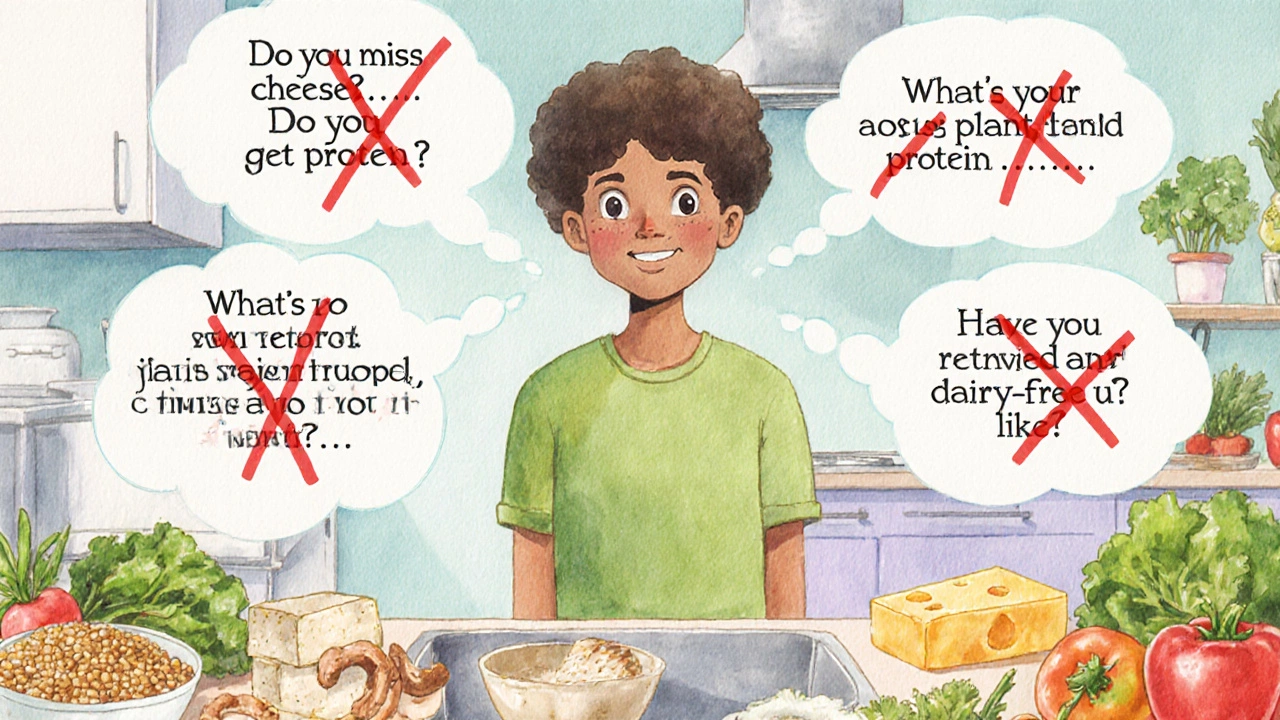When talking about plant‑based lifestyles, Veganism is a dietary and ethical practice that excludes all animal products, including meat, dairy, eggs, and often honey. It’s more than a menu choice; it’s a worldview shaped by health, environment, and animal welfare concerns. Because of that, the questions you toss across the table can either spark a genuine exchange or shut down the conversation in an instant.
Why etiquette matters in a vegan conversation
Imagine you’re at a dinner party and a vegan guest is served a salad. If you ask, “Do you get enough protein?” you’ve instantly implied a deficiency. That little remark can feel like judgement, even if you meant it as curiosity. Respectful dialogue doesn’t just keep the vibe friendly-it shows you value the person’s choices and avoids reinforcing stereotypes.
Common insensitive questions and why they backfire
- “Do you eat meat?” - Assumes the answer is always “no” and puts the person on the spot.
- “Are you okay? You look thin.” - Links veganism to unhealthy weight, ignoring the diversity of body types.
- “Do you miss cheese?” - Reduces a nuanced lifestyle to a single food craving.
- “Isn't it hard to get enough protein?” - Reinforces the myth that plant‑based diets are nutritionally inadequate.
- “Why don’t you just eat a salad?” - Suggests vegans lack culinary creativity.
- “Do you still wear leather shoes?” - Mixes ethical choices with fashion, often irrelevant to the dining context.
Each of these questions touches on a deeper assumption, whether it’s about health, taste, or morality. When you challenge those assumptions without context, you risk alienating the person you’re talking to.
What’s actually true? Debunking the myths
To replace the uncomfortable queries, let’s look at some facts.
First, protein. A well‑planned Plant‑based diet relies on legumes, nuts, seeds, tofu, and seitan to meet protein needs can easily provide the recommended 0.8 g per kilogram of body weight. In fact, a cup of cooked lentils offers about 18 g of protein, more than a typical serving of chicken breast.
Second, nutrient adequacy. While vegans need to pay attention to vitamin B12, iron, calcium, and omega‑3 fatty acids, fortified foods and supplements make up the shortfall. The myth that vegans are automatically deficient overlooks the growing market of fortified plant milks, nutritional yeast, and algae‑based omega‑3s.
Third, taste variety. Dishes built around Tofu a soy‑derived protein that absorbs flavors from marinades and sauces or Seitan a wheat‑gluten product prized for its meat‑like texture showcase the culinary flexibility vegans enjoy. It’s not just salads; it’s hearty stews, grilled kebabs, and decadent desserts.

Better ways to engage: respectful alternatives
Instead of “Do you miss cheese?” try an open‑ended invitation:
“I’m experimenting with vegan cheese made from cashews-have you tried something like that?”
Or, if you’re curious about nutrition, ask about their favorite protein sources:
“What’s your go‑to ingredient when you need a protein boost?”
These approaches show genuine interest without presuming a problem.
Practical tips for everyday conversations
- Focus on the food, not the philosophy. Ask about flavor, texture, or cooking methods.
- Do a quick fact‑check before you speak. If you’re unsure about a nutritional claim, say, “I read something about that-what’s your experience?”
- Avoid “but why” statements that imply a hidden agenda. Instead of “But why would you give up meat?” try, “What inspired you to try a vegan lifestyle?”
- Respect personal boundaries. If someone signals they don’t want to discuss their diet, gracefully shift the topic.
- Celebrate the positives. Compliment a vegan dish you enjoyed: “That mushroom risotto was amazing-how did you get it so creamy?”

Quick reference: Questions to avoid vs. Acceptable alternatives
| Question to avoid | Why it’s problematic | Respectful alternative |
|---|---|---|
| Do you get enough protein? | Implies a deficiency | What’s your favorite protein‑rich vegan ingredient? |
| Why don’t you eat meat? | Assumes a moral judgment | What inspired you to choose a plant‑based diet? |
| Do you miss cheese? | Reduces lifestyle to a single craving | Have you tried any dairy‑free cheese that you like? |
| Is it hard to eat out? | Generalizes the experience | Do you have any favorite vegan restaurants in town? |
| Are you OK? You look thin. | Links diet to health without basis | How do you feel on your current diet? |
Handling awkward moments gracefully
If you slip and ask a taboo question, a quick acknowledgment can ease tension. Say, “Sorry, that was a clumsy way to phrase it. I’m genuinely interested in learning more about your perspective.” This shows humility and a willingness to improve.
Finally, remember that not every vegan wants to discuss their choices. Treat the conversation like any other personal topic-read the room and adjust.
Wrap‑up
Practicing vegan etiquette isn’t about walking on eggshells; it’s about swapping judgment for curiosity, and assumption for genuine interest. By steering clear of the ten “no‑go” questions listed above and opting for the respectful alternatives, you’ll create a welcoming space for everyone at the table.
Can vegans get enough protein without meat?
Absolutely. Foods like lentils, chickpeas, tofu, tempeh, quinoa, and seitan provide ample protein. A varied plant‑based diet easily meets the recommended daily intake.
Is it rude to ask a vegan about their diet?
It’s not the question itself but how you ask. Open‑ended, non‑judgmental phrasing respects their choices, while “why don’t you eat meat?” can feel accusatory.
Do vegans need supplements?
Vitamin B12 is the most common supplement vegans take because it’s primarily found in animal products. Iron, calcium, and omega‑3s can be sourced from fortified foods or algae supplements, but many vegans meet these needs through diet alone.
How can I make a vegan dish feel indulgent?
Use umami‑rich ingredients like mushrooms, miso, or smoked paprika. Incorporate creamy elements such as cashew‑based sauces or coconut milk, and finish with a sprinkle of toasted nuts for texture.
What’s a good conversation starter about vegan food?
Try asking about recent vegan recipes they love or a restaurant they recommend. Example: “I heard about a new vegan taco place-have you tried it?”

